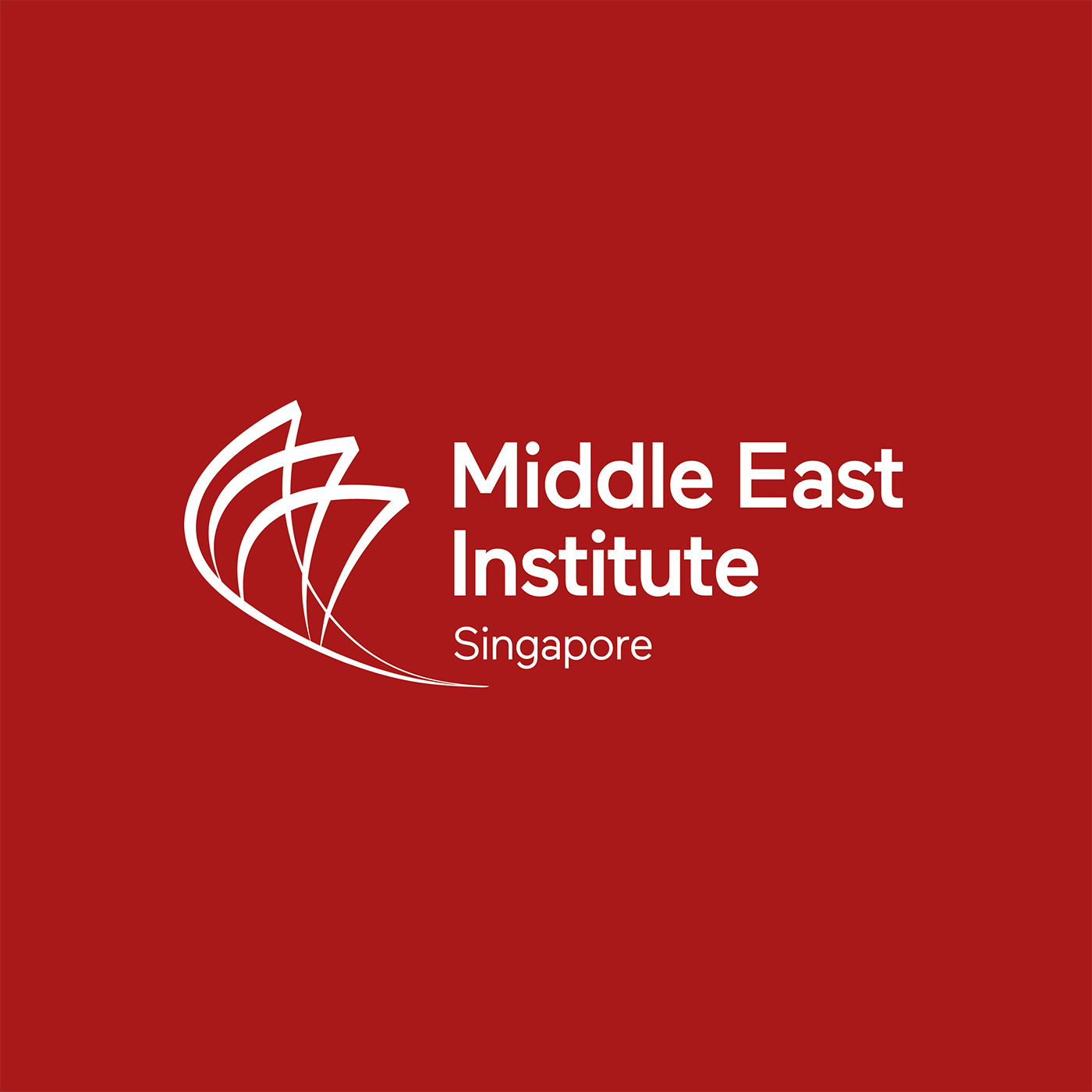Episodes
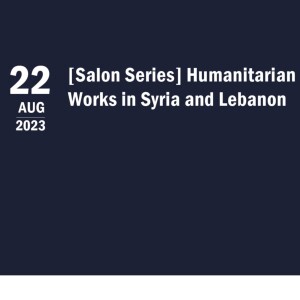
Wednesday Aug 23, 2023
Humanitarian Works in Syria and Lebanon
Wednesday Aug 23, 2023
Wednesday Aug 23, 2023
The Syrian civil war, which began over a decade ago, created a massive humanitarian crisis which displaced more than five million people, with many escaping into neighbouring countries.
Turkey harbours the most Syrian refugees, at three million, while Jordan and Lebanon have taken in over a million each, respectively.
Their plight has attracted the attention of many humanitarian agencies around the world, including in Singapore, where Love Aid Singapore has played an active role for the last eight years or so.
Love Aid Singapore humanitarian work is mainly focused on the educational needs of poor and orphaned kids. To this end, Love Aid Singapore funds their education to the tune of US$150 per year per child, with the programme benefitting more than 100 orphaned children so far.
In addition to helping children, Love Aid Singapore also operates an annual Ramadan humanitarian drive, which provides food and other items of need, as well as a winter programme, which equips refugees with fuel, heaters, and clothes to help them endure the conditions.
To highlight the efforts of Love Aid Singapore, the Middle East Institute hosted Mr Gilbert Goh, over a talk cum mini photo exhibition.
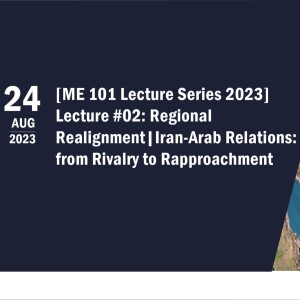
Tuesday Aug 29, 2023
Tuesday Aug 29, 2023
China’s growing footprint in the Middle East culminated in March 2023 when Saudi Arabia and Iran announced a historic rapprochement in Beijing. The PRC was not just the host but directly mediated the final rounds of talks between the two Persian Gulf rivals. Only a few months later, building on the momentum of the KSA-Iran diplomatic success, China doubled down, proposing itself as a mediator between Israel and Palestine. Although Beijing’s unprecedented diplomatic boldness in the region surprised many, it hardly represents a substantial change in the PRC’s strategy in the Middle East. Nor it represents the inception of a new regional security architecture with Chinese characteristics. This presentation will elucidate what is behind China’s diplomatic push, reflecting on how it might or might not interplay with other regional initiatives such as the Abraham Accords and if it is set to change the balance of (external) power in the Middle East.
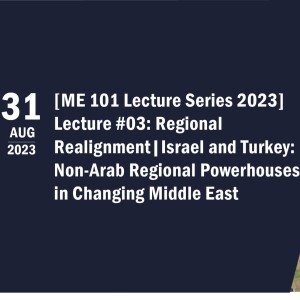
Sunday Sep 03, 2023
Sunday Sep 03, 2023
This lecture will study and compare the evolution of the foreign policies of Israel and Turkey. As two non-Arab Middle Eastern countries, Israel and Turkey historically built a bilateral partnership that went through multiple crises in the past decade. However, the recent warming-up of ties between both governments suggest a restoration of the bilateral military and economic cooperation. Against that backdrop, the lecture will explore the regional drivers of the IsraeliTurkish partnership, its implications for the Middle East security architecture, and the ways domestic politics in both countries could derail strategic plans.
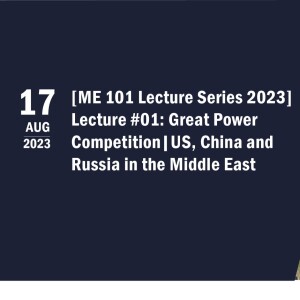
Wednesday Sep 06, 2023
ME101 Lecture 1:Great Power Competition – US, China and Russia in the Middle East
Wednesday Sep 06, 2023
Wednesday Sep 06, 2023
This lecture will cover the latest developments in the great power competition – namely between
the US, Russia, and China – and its effects on the Middle East. It will study the current foreign
policy agenda of Washington, Beijing, and Moscow towards the Middle East and assess how this
rivalry takes different forms, be it military, diplomatic, economic, or informational. Meanwhile, it
will discuss how regional powers such as Saudi Arabia, Israel, or the UAE, have been revising their
own strategies in light of this new “cold war” environment.
![[Book Talk] New Military Strategies in the Gulf](https://pbcdn1.podbean.com/imglogo/ep-logo/pbblog4563756/Video_Opening_Title_cvrfq3_300x300.jpg)
Sunday Sep 10, 2023
[Book Talk] New Military Strategies in the Gulf
Sunday Sep 10, 2023
Sunday Sep 10, 2023
In the last decade, rulers in Gulf regimes have aspired to greater strategic autonomy and putting some distance between them and the West. Coined the “Gulf moment” by local commentators, this regional trend reflects a redistribution of power in the Arab world. This new book from Jean-Loup Samaan, Senior Research Fellow at the Middle East Institute, is the first to examine the military dimensions of these shifts. Gulf military strategy has prioritised the improvement of local armed forces and the diversification of defence partnerships towards countries such as Russia, Turkey or China. However, Dr Samaan’s book shows how this has led to the militarisation of Gulf societies, the further erosion of multilateral initiatives – including the Gulf Cooperation Council – and the region’s perilous involvement in the war in Yemen. It also highlights an enduring reliance on the West.
This book talk will examine the evolving strategic ambitions of the Gulf countries. Close attention will be paid to Saudi Arabia, the United Arab Emirates, and Qatar, countries that have played prominent roles in the region’s security affairs over the last decade. In light of increased tensions over China’s presence in the region, the discussion will also explore the ways Gulf states may wind up in the middle of the competition between Washington and Beijing.
Book discount:
Use the following discount codes to save 20% on this book when purchasing on Bloomsbury.com
UK and rest of world customers: GLR CA3UK
US customers: GLR CA3US
Canada customers: GLR CA3CA
Australia and New Zealand customers: GLR CA3AU
Click here for the book flyer.
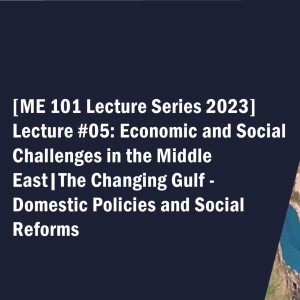
Sunday Sep 17, 2023
ME101 Lecture 5 - The Changing Gulf: Domestic Policies and Social Reforms
Sunday Sep 17, 2023
Sunday Sep 17, 2023
This lecture will provide insights into the latest developments in the socio-cultural landscape of the Gulf Arab states. Conceptually, the long-held rentier model in academic scholarship no longer has the same purchase that it once did, owing to a slew of domestic reforms implemented notably in the UAE and Saudi Arabia. Economic diversification and urbanisation have also altered societal attitudes in a region where the family unit has been a social anchor. The presentation will also examine social demographics, including the need for professional foreign talent and low-skilled labour. The reassertion of kinship ties, among other preserved traditions, is equally an indication that national, if not, localised identity is a priority against the forces of modernisation.
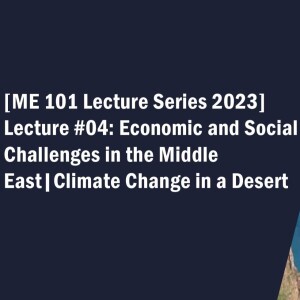
Tuesday Sep 19, 2023
ME101 Lecture 4 - Climate Change in the Desert
Tuesday Sep 19, 2023
Tuesday Sep 19, 2023
Marked by hot and arid climate and vast disparities of security and wealth, climate change brings unique challenges to the Middle East. The region is already battling with common challenges of water scarcity, desertification, biodiversity loss and low levels of food self-sufficiency, aggravated by climate change. Temperatures in the region have already risen by 1.5°C — twice the global increase over the past three decades — and climate models for the region until the end of the century estimate a continuous rise. Rainfall in the region has become more variable and the intensity and frequency of climate-related hazards such as extreme temperatures, storms, floods and droughts have become more visible and are likely to increase because of climate change, exacerbating existing environmental, socio-economic and security challenges. The objectives of
this lecture are twofold: provide an overview of climate change challenges facing the Middle East region and discuss current policies meant to mitigate the effects of climate change in the region.
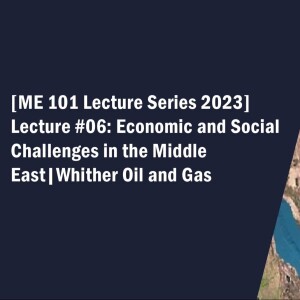
Sunday Sep 24, 2023
ME 101 Lecture 6: Whither Oil and Gas
Sunday Sep 24, 2023
Sunday Sep 24, 2023
This talk offers a lively discussion of five common stereotypes of oil/gas in the Middle East
including ‘Oil and gas is just about the only thing the Middle East exports’; ‘The decline of oil demand in future is bad for the Middle East’, ‘The oil and gas exporting states in the Middle East are climate deniers’. Participants should come away with a clearer understanding of the role of hydrocarbons in the past, present, and future of the Middle East.
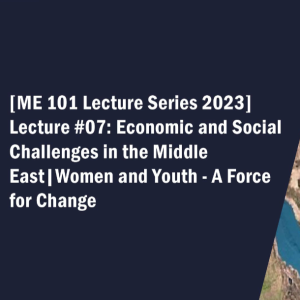
Sunday Oct 01, 2023
ME 101 Lecture 7 - Women and Youth: A Force for Change
Sunday Oct 01, 2023
Sunday Oct 01, 2023
The lecture will discuss shifting patterns of further and higher education choices of young people in Saudi Arabia under Vision 2030 and how these shifts influence and are influenced by new labour market trends in the Kingdom.
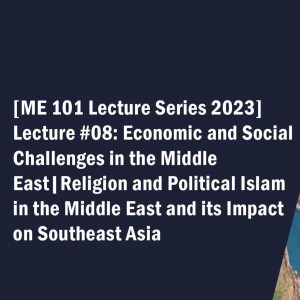
Monday Oct 09, 2023
Monday Oct 09, 2023
Are Islam and Malay culture in Southeast Asia becoming more Arabised? Several academics and policymakers reckon that Muslims in Southeast Asia, whom they once regarded as the “smiling face of Islam”, are now alienating their cultural practices by mimicking Middle Eastern fashion and lifestyle. They shun Malay words, dressing, and food, in favour of Middle Eastern lifestyles in the name of being better Muslims. This lecture examines critically dominant images of Southeast Asian Islam, focussing on three countries, Singapore, Indonesia and Malaysia. It highlights the interaction between the region and the Middle East. Applying the socio-historical approach, the lecture makes three arguments: (1) while Islam originated from the Middle East, the type of Islam
brought to Southeast Asia was predominantly the Sufi type; (2) the heterogeneity of Islam in the Middle East also shapes Southeast Asia differently, depending on which era is discussed, and the country of focus; and (3) Islam and politics take many forms in Southeast Asia, and they adopt and adapt to global and local dynamics, such as capitalism, feudalism, socialism, and revivalism.
The impact of Middle East movements Sufism, Shiism, Muslim Brotherhood, Salafi-Wahhabism, Hizmet and reformism will also be discussed. It argues that evolving Muslim lifestyles in Southeast Asia intersect with changing socio-economic structures of Southeast Asian societies, the use of English in religious transmission throughout the Islamic worlds (rather than Arabic), and Southeast Asian religious elites themselves being the agents of cultural transformation.

